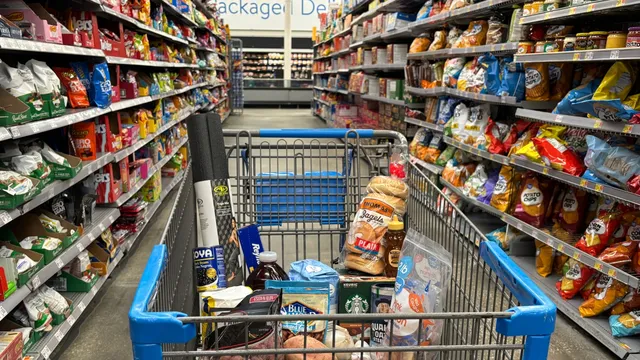
Trump's spending bill threatens food assistance for millions of Americans
2025-07-03 23:16- Food banks report an alarming increase in demand for assistance amid proposed spending cuts.
- The House's passing of the spending bill could result in significant reduction of SNAP, impacting millions.
- Experts warn that these cuts may lead to a food insecurity crisis for many families across America.
Express your sentiment!
Insights
In an alarming development for American households reliant on food assistance, a recent spending bill proposed by President Donald Trump has raised serious concerns regarding potential reductions to the Supplemental Nutrition Assistance Program (SNAP). Food banks across the United States are bracing for a significant surge in demand for their services. The Congressional Budget Office estimates that if this spending bill passes, it could result in cuts totaling nearly $300 billion to SNAP, marking the largest reduction in the program's history and impacting the food security of millions. The ripple effects of these cuts are expected to be profound. Currently, SNAP serves over 41 million Americans, including more than 13 million children, providing vital food assistance to communities across the country. Food banks, which typically rely on SNAP as a supplemental resource, are already reporting an increase in demand for food assistance, surpassing even the levels observed during the peak of the COVID-19 pandemic. The food insecurity crisis has become a pressing issue, with experts indicating that the removal of SNAP assistance could lead to an increase in hunger and hardship for many families. As the spending bill proceeds through Congress, representatives and community leaders are raising alarms. For instance, Representative Jason Crow (D-CO) described the sentiment among his constituents as one of fear and anxiety, with many unsure about their ability to provide for their families amidst potential cuts. He emphasized that the consequences of this legislation would disproportionately affect the working class and vulnerable populations, suggesting that the bill represents a significant transfer of wealth away from the middle class toward the wealthy elite. Food bank executives are preparing for a future of increased hardship, noting that they cannot fill the gap that would be left by such extensive cuts to SNAP. Multiple food banks have highlighted that for every meal provided through their services, SNAP provides approximately nine meals. The loss of this program would create a substantial burden on food banks already struggling to meet rising demands. Efforts to raise funds and seek community support are ongoing, but the consensus is clear: without federal support for SNAP, the situation for many American families could become dire as they face the challenges of rising food prices and insufficient resources to meet their basic nutritional needs.
Contexts
The Supplemental Nutrition Assistance Program (SNAP) plays a critical role in supporting food security for millions of Americans. With recent cuts to SNAP funding, the impact on food banks across the country is becoming increasingly pronounced. Food banks have long served as a safety net for individuals and families facing food insecurity and have relied on SNAP as a fundamental resource that helps bridge the gap for those struggling to afford adequate meals. Reductions in SNAP benefits have led to an uptick in demand for food bank services, which are now experiencing an unprecedented strain on their resources. Additionally, many food banks are reporting that they are unable to meet the growing needs of their communities due to insufficient supplies and increased operational costs associated with fulfilling this demand. As food banks adapt to these challenges, many are implementing innovative strategies to optimize their resource allocation and increase community outreach. However, the consequences of SNAP cuts extend beyond mere supply shortages. With more individuals turning to food banks, these organizations are faced with the daunting task of addressing the complex needs of diverse populations, including families with children, the elderly, and those with disabilities. The growing reliance on food banks may also obscure systemic issues related to poverty and inequitable access to resources, which can hinder long-term solutions to food insecurity. It is crucial for policymakers to recognize that while food banks provide essential assistance, they cannot replace the necessity of robust and well-funded nutrition programs like SNAP. Moreover, food banks are not designed to handle the scale of food assistance that SNAP provides, and thus, they find themselves in an ongoing struggle to stabilize operations while simultaneously responding to heightened demand. Many food banks have reported an increase in operational costs due to rising food prices, necessitating the need for expanded funding and partnerships with local grocers, farms, and community organizations. Collaborative efforts can help maximize the efficiency of food distribution and ensure that nutritious options are available for those in need. Additionally, food banks are stepping up community engagement initiatives to foster volunteerism, enhance public awareness about food insecurity, and encourage donations. In conclusion, the cuts to SNAP have a cascading effect on food banks and highlight the urgent need for advocacy and reform to protect nutritional assistance programs. As food banks continue to tackle the challenges posed by diminished SNAP benefits, it becomes imperative for stakeholders—whether governmental, nonprofit, or community-oriented—to come together to preserve and expand access to vital food resources. Ensuring the sustainability of food banks while addressing the root causes of food insecurity will require comprehensive policy changes and consistent support from all sectors of society, emphasizing that food security is a fundamental human right.